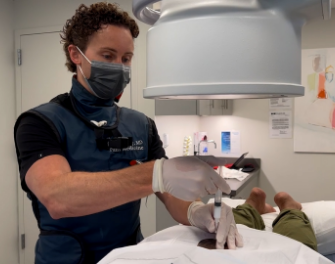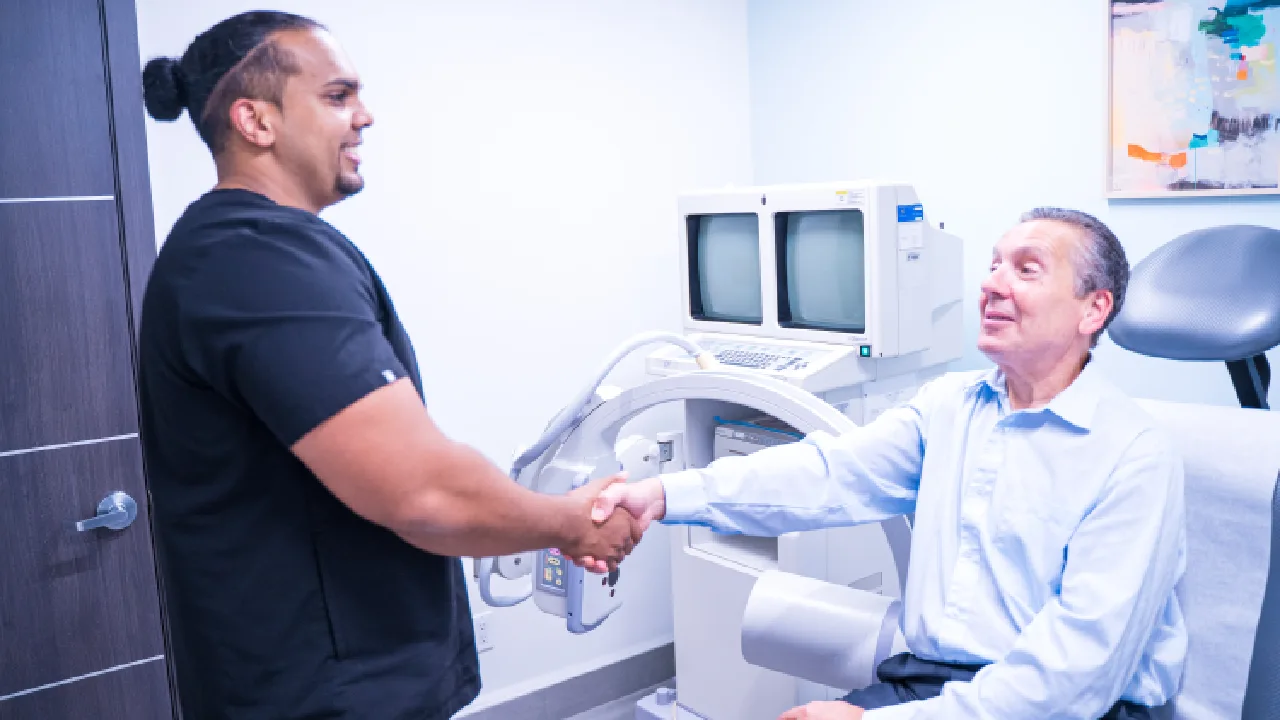
When to See a Doctor for Pain: Understanding the Signs
Pain, whether chronic pain or acute pain, can significantly impact your quality of life. Knowing when to seek medical attention for pain is crucial for effective management and potential relief. At Pain Treatment Specialists, we understand the complexities of pain and offer minimally invasive treatments led by board-certified interventional pain doctors. In this guide, we explore various signs indicating when it’s time to see a doctor for pain.
Are you interested in get more information about your condition or get a treatment?
Fill the form below to start!
1. Persistent Pain that Interferes with Daily Activities
If you’re experiencing pain that persists for an extended period and disrupts your daily routine, it’s essential to seek medical advice. Chronic pain, lasting beyond the expected period of healing, can stem from various underlying conditions such as arthritis, nerve damage, or injury. Our pain management doctors specialize in diagnosing the root cause of chronic pain and developing personalized treatment plans to alleviate discomfort and improve your quality of life.
2. Severe or Intolerable Pain
When pain becomes severe and unbearable, it’s a clear indication to consult a pain management specialist. Severe pain can be a sign of an underlying medical condition that requires immediate attention. At Pain Treatment Specialists, we prioritize patient comfort and well-being, offering effective interventions to manage severe pain without opioids or surgeries.
3. Limited Range of Motion
If pain is limiting your ability to move or affecting your range of motion in joints, muscles, or limbs, it’s advisable to seek medical evaluation. Joint pain, stiffness, and reduced flexibility can indicate conditions such as osteoarthritis, rheumatoid arthritis, or musculoskeletal injuries. Our interventional pain doctors employ advanced diagnostic techniques to identify the source of joint pain and develop tailored treatment strategies to restore mobility and function.
4. Pain that Persists Beyond the Expected Healing Period
It’s normal to experience some degree of pain during the initial healing phase following an injury or surgical procedure. However, if pain persists beyond the recovery period or worsens over time, it warrants medical attention. Delayed healing or unresolved pain may indicate complications that require care. Our pain specialists utilize cutting-edge techniques to address post-surgical pain and facilitate optimal recovery without resorting to opioid medications.
5. Pain Accompanied by Other Symptoms
When pain is accompanied by additional symptoms such as fever, swelling, numbness, tingling, or weakness, it may signify a more complex medical issue. These symptoms could indicate nerve compression, inflammation, infection, or systemic conditions requiring prompt evaluation and treatment. Our team of experts conducts thorough assessments to identify underlying causes and offers comprehensive care tailored to your individual needs.
6. Recurrent or Worsening Pain
Recurrent episodes of pain or a gradual worsening of symptoms should not be ignored, as they may indicate progressive conditions. Ignoring persistent pain can lead to further complications and decreased quality of life. Our pain management specialists offer early intervention and proactive management to prevent the progression of pain conditions.
7. Pain that Interferes with Sleep
Pain that disrupts your sleep patterns or prevents you from getting adequate rest can have detrimental effects on your overall health and well-being. Sleep disturbances caused by pain can exacerbate existing conditions and impair your ability to function during the day. Our multidisciplinary approach to pain management addresses the underlying causes of sleep disturbances and incorporates strategies to improve sleep quality.
8. Unexplained or Unrelenting Pain
If you’re experiencing unexplained pain that persists despite trying conservative measures or over-the-counter medications, it’s advisable to seek expert evaluation. Unrelenting pain that does not respond to self-care measures may indicate an underlying condition that requires specialized treatment. Our interventional pain doctors employ a holistic approach to pain management, focusing on identifying and addressing the root cause of pain.
Treatment Options for Pain Management
At Pain Treatment Specialists, we offer a range of advanced treatment options tailored to address various pain conditions without relying on opioids or invasive surgeries. Our minimally invasive interventions target the source of pain, providing targeted relief while minimizing downtime and discomfort. Some of our key treatment modalities include:
- Interventional Procedures: We specialize in a variety of minimally invasive procedures, including nerve blocks, epidural injections, radiofrequency ablation, and spinal cord stimulation, to alleviate pain and restore function.
- Physical Therapy: Our integrated approach may include physical therapy programs designed to improve strength, flexibility, and mobility while reducing pain and preventing recurrence.
- Medication Management: When appropriate, we judiciously use medications to complement other treatments, provide symptom relief, and minimize side effects and dependency risks.
- Lifestyle Modifications: Our team provides guidance on lifestyle modifications, ergonomic adjustments, and self-care techniques to empower patients to manage their pain.
FAQs
When should I see a doctor for joint pain?
If you’re experiencing persistent or worsening joint pain, it’s advisable to seek medical evaluation. Joint pain can stem from various underlying conditions such as arthritis, bursitis, tendonitis, or joint injuries. Our pain management doctors specialize in diagnosing and treating joint pain, offering personalized treatment plans to address the root cause and improve mobility.
What are the common causes of chronic pain?
Chronic pain can result from a wide range of conditions, including arthritis, fibromyalgia, nerve damage, musculoskeletal disorders, and autoimmune diseases. Additionally, past injuries, surgeries, or trauma can contribute to persistent pain. Our team of experts conducts comprehensive evaluations to identify the underlying causes of chronic pain and develop tailored treatment strategies for optimal relief.
How can I differentiate between acute and chronic pain?
Acute pain typically arises suddenly in response to an injury, surgery, or illness and resolves once the underlying cause is treated or healed. Chronic pain, on the other hand, persists beyond the expected period of healing, lasting for weeks, months, or even years. If pain persists or worsens over time, it’s essential to seek medical evaluation, as chronic pain may require specialized management to improve symptoms and quality of life.
What treatment options are available for nerve pain?
Nerve pain, also known as neuropathic pain, can be challenging to manage but can often be alleviated with targeted interventions. Treatment options may include nerve blocks, medications targeting nerve pain pathways, physical therapy, and alternative therapies such as acupuncture or chiropractic care. Our pain specialists employ a multidisciplinary approach to address nerve pain comprehensively and improve patient outcomes.
Can pain management treatments help avoid surgery?
Yes, many minimally invasive pain management treatments can help avoid the need for surgery or serve as an alternative for those who are not surgical candidates. Procedures such as nerve blocks, epidural injections, radiofrequency ablation, and spinal cord stimulation can effectively alleviate pain and improve function without the risks and downtime associated with surgery. Our goal at Pain Treatment Specialists is to provide non-surgical solutions whenever possible.
Are there any side effects associated with pain management treatments?
While most pain management treatments are considered safe and well-tolerated, some may carry potential side effects or risks. Common side effects may include temporary soreness at the injection site, minor bruising, or allergic reactions to medications. Our team thoroughly discusses potential risks and benefits with patients before proceeding with any treatment.
How long does it take to experience relief from pain management treatments?
The time it takes to experience relief from pain management treatments varies depending on the type of procedure performed, the underlying condition being treated, and individual factors such as pain severity and overall health. While some patients may experience immediate relief following a procedure, others may require several days or weeks to notice improvement. Our team closely monitors patient progress and adjusts treatment plans as needed.
Can pain management treatments be combined with other therapies?
Yes, pain management treatments can often be combined with other therapeutic modalities to enhance effectiveness and improve outcomes. For example, physical therapy, acupuncture, massage therapy, or psychological counseling may complement pain interventions by addressing underlying musculoskeletal imbalances, promoting relaxation, and reducing stress. Our interdisciplinary approach integrates various modalities to provide comprehensive care.
Does insurance cover pain management treatments?
Many insurance plans cover pain management treatments, including consultations, diagnostic tests, and minimally invasive procedures. However, coverage may vary depending on your insurance provider, specific policy terms, and individual eligibility criteria. At Pain Treatment Specialists, we offer hassle-free insurance verification before the first appointment to help patients understand their coverage. Our team assists patients in maximizing their insurance and minimizing out-of-pocket expenses whenever possible.
Time to Seek Relief
Knowing when to see a doctor for pain is the first step toward finding relief and reclaiming your quality of life. Whether you’re struggling with chronic pain, acute injuries, or debilitating symptoms, our team of board-certified interventional pain doctors is here to help. At Pain Treatment Specialists, we prioritize patient care and offer compassionate, personalized treatment solutions tailored to your unique needs. Don’t let pain hold you back any longer – schedule a consultation with us today.
FEATURED POSTS BY PAIN DOCTORS



















